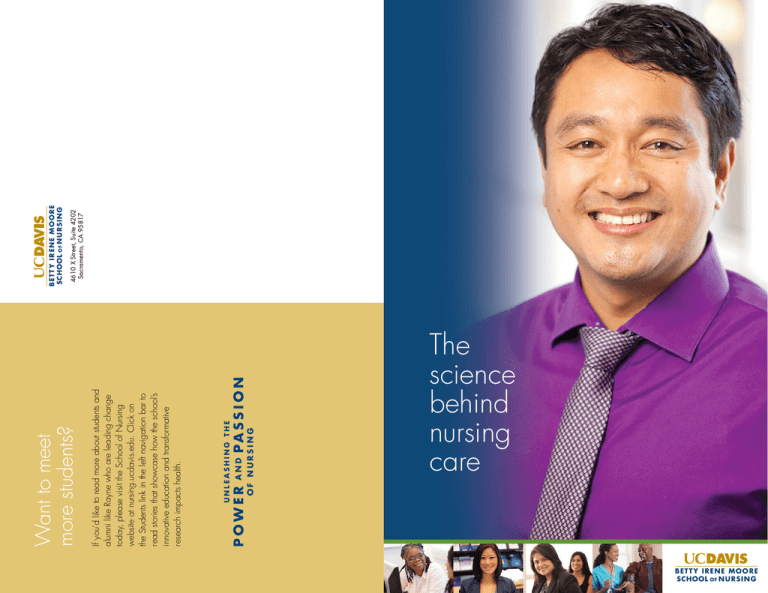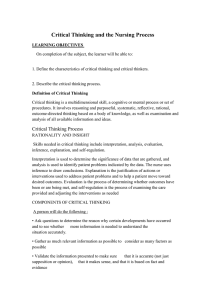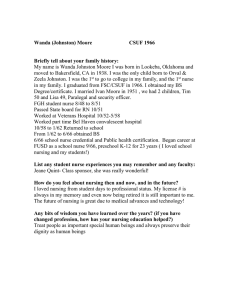The science behind nursing
advertisement

PA S S I O N AND OF NURSING POWER UNLEASHING THE If you’d like to read more about students and alumni like Rayne who are leading change today, please visit the School of Nursing website at nursing.ucdavis.edu. Click on the Students link in the left navigation bar to read stories that showcase how the school’s innovative education and transformative research impacts health. Want to meet more students? The science behind nursing care BET T Y IRENE MOORE SCHOOL OF NURSIN G 4610 X Street, Suite 4202 Sacramento, CA 95817 BET T Y IRENE MOORE SCHOOL OF NURSIN G nurse and doctoral student at the Betty Irene Moore School of Nursing at UC Davis, immerses himself in patient data — from fall rates to the number of hospital acquired infections — which he analyzes to improve quality through updated hospital procedures or staff and resource changes. He also educates nurse managers in the field of health informatics. “I love being a nurse, but I also love the technology — taking care of people through all methods. My work improves the way we interact with patients and deliver quality care,” Soriano said. Soriano began his career in the emergency department where research he learned the value of data — toward his its capacity to help nurses and Nursing nurse managers prioritize and Science and address problems. As he moved Health-Care quickly through the ranks at Kaiser Leadership Permanente, one of the state’s largest doctoral degree, health systems, Soriano led a team he examines a that introduced the use of a hospitalnurse manager’s wide electronic health record system. role in leveraging technology to The system helps provide better improve patient care. He found a gap coordination of care by allowing in information of how nurse managers health professionals, like Soriano, utilize these systems. to observe trends to “How are nurse maximize patient safety “I love being managers using data and quality of care. a nurse, but I to allocate resources As part of Soriano’s also love the and get a pulse on the technology — quality and safety of taking care care?” Soriano asked.“ of people through If we get people R AY N E SOR IA NO, all methods.” —Nurse and doctoral student Rayne Soriano Doctoral student Rayne Soriano, above middle, demonstrates how health professionals, including nurses, physicians and technicians, can apply technology to improve health-care delivery. inspired to use technology, and design it well, we can utilize the systems to build better outcomes.“ According to Soriano, hospitals operate much like an airport. He compares the role of a nurse manager at a hospital to an airport’s air traffic controller: each manages a complex network of activities ensuring people’s safety. Nurse managers manipulate schedules, coach other nurses and engage employees and patients to assure an environment of safety. He said more nurse leaders are needed with the ability to take action beyond the input and review of data. Nurse leaders must also use that data as a tool to improve patient outcomes including fall rates, infections and bed sores. During the initial stages of implementation of the electronic health record system at his workplace, Soriano prepared staff on how to use the new system while observing how it is utilized by health-care providers. In doing so, Soriano discovered his passion for teaching. Once Soriano graduates, he plans to teach at the university level. He wants to guide new graduates, the way he was guided by his professors, that people do come first and technology can be integrated into their lives to improve their health. “The value of going back to school is to get the skills to use on a grander scale. My contribution is to put it all together — compassion, empathy and technology — to improve the way care is delivered,” Soriano said. “At the end of the day, what I really want to do is influence the future of the nursing profession as part of a coordinated team.” Soriano’s graduate study is supported in part through the founding grant from the Gordon and Betty Moore Foundation. to share this or contact us with any comments or questions. We welcome your feedback. For more information, visit nursing.ucdavis.edu or contact the School of Nursing at 916-734-2145 or at BettyIreneMooreSON@ucdmc.ucdavis.edu. P L E AS E F E E L F RE E





